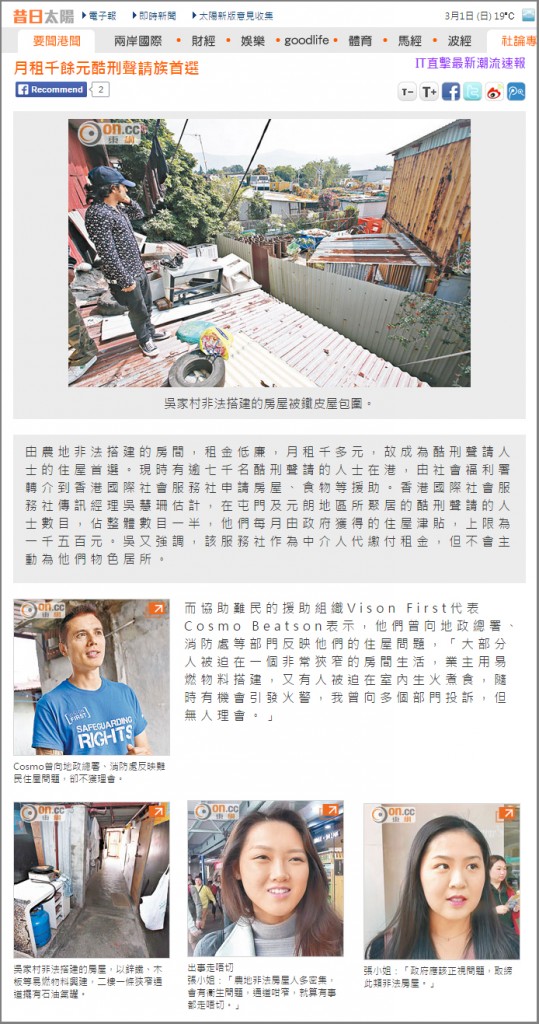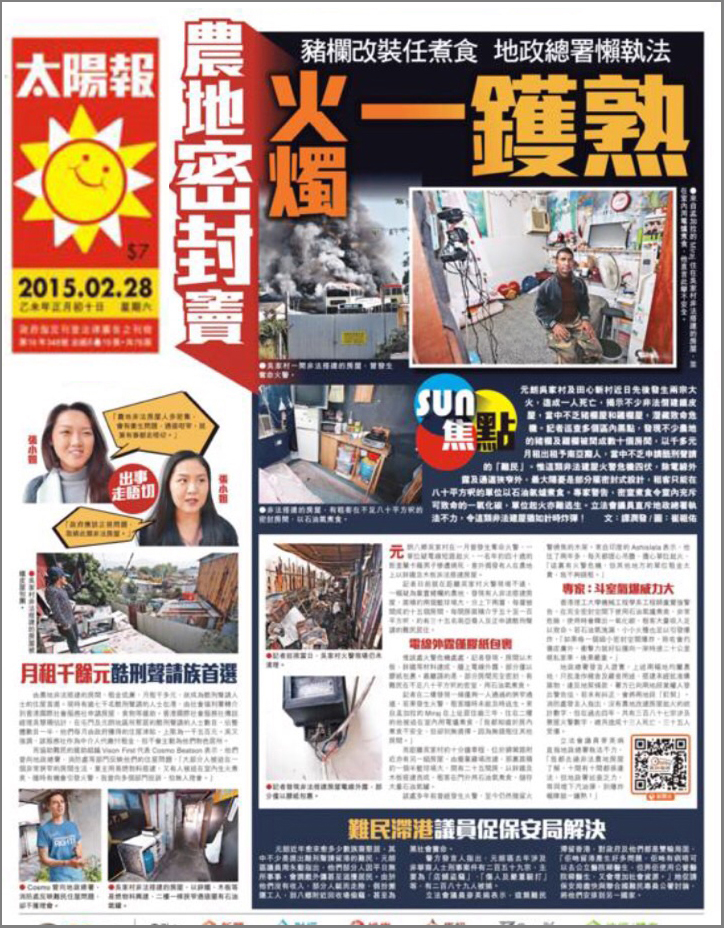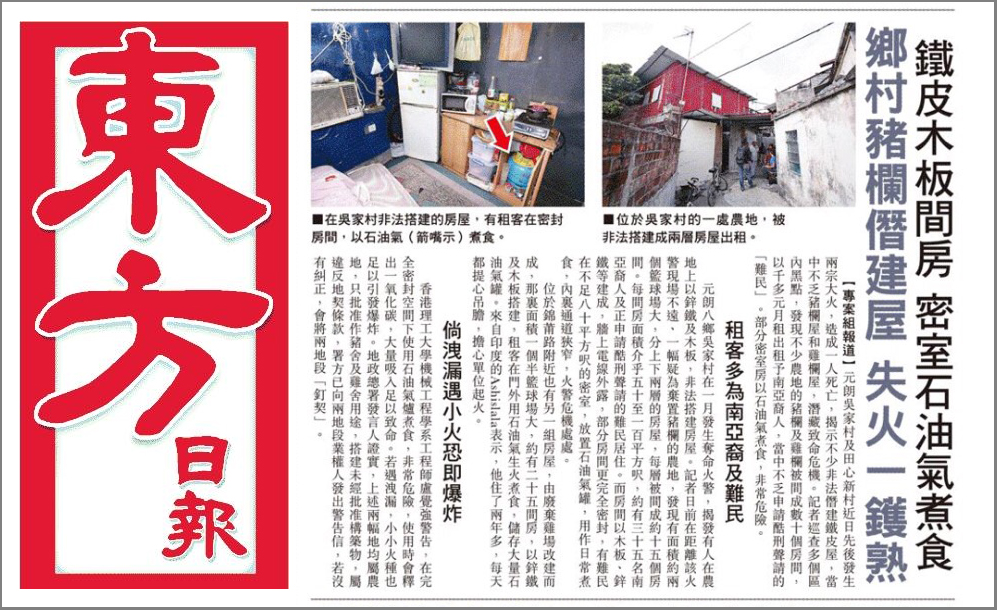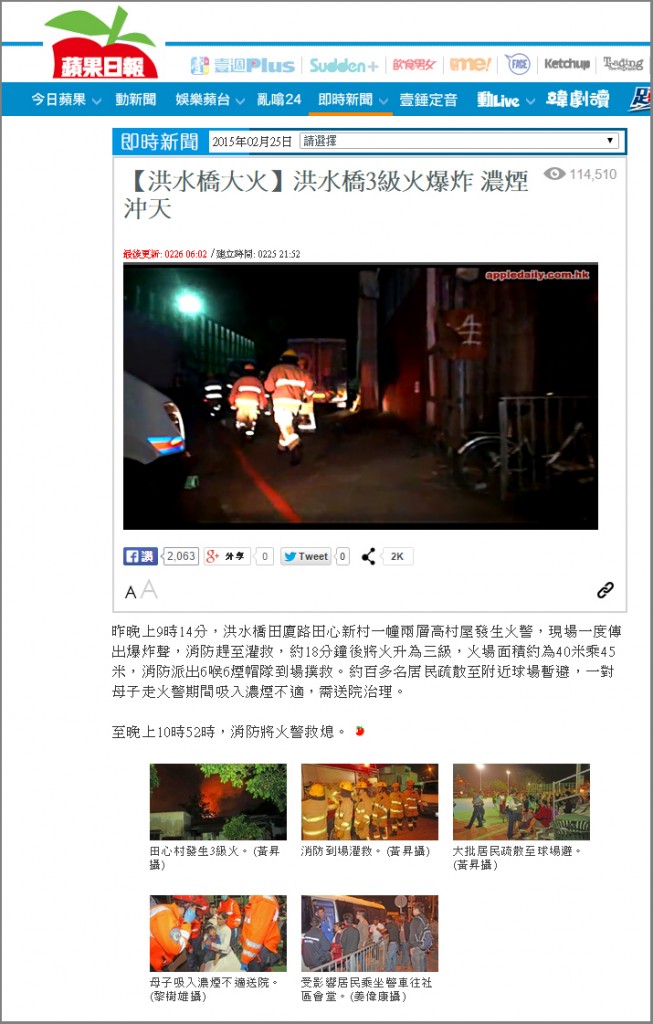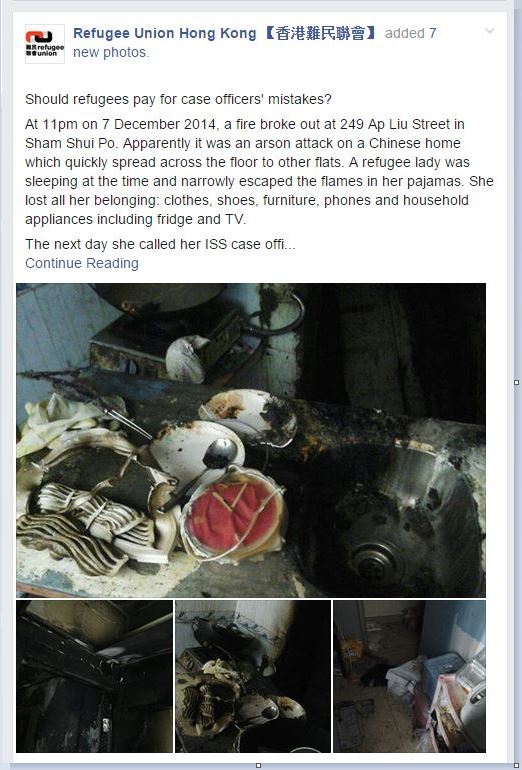Archive
“Oriental Daily” on Lands Department failures
Mar 1st, 2015 | Housing, Legal, Media, Welfare | Comment
Apple Daily on the fire in a refugee slum on 25 Feb 2015
Feb 28th, 2015 | Housing, Media, Welfare | Comment
Should refugees pay for case officers’ mistakes?
Feb 28th, 2015 | Crime, Housing, Personal Experiences, Refugee Community, Welfare | Comment
Blaze incinerates a refugee slum favored by ISS-HK
Feb 27th, 2015 | Crime, Housing, Personal Experiences, Welfare | Comment
Nobody was prepared to witness the devastation wrought by last night blaze on “The slum with the rusty gate” which Vision First brought to the attention of the authorities in October 2013 for reasons including a considerable fire hazard. In 2015 acts of God seem arranged to shut down refugee slums which (un)concerned government departments have been reluctant to dismantle.
Walking over the soaked remains of incinerated shacks which offered no sprinklers, fire extinguishers or fire hydrants (fire services laid hoses for trucks several hundred meters away), refugees observed it was a miracle nobody had died. “If the fire happened two hours later when everyone was asleep and the doors were locked, something worse would have happened for sure” noted Mumtaz, whose wife dashed out with their 2.5 month-old daughter, without a chance to grab her purse.
Burned remains, perforated tin sheets and bent metal beams reveal a conflagration that a crew of 165 firefighters with 35 fire engines could not contained till every shacks had been consumed by the raging fire. Eight fire trucks were dispatched to the nearest access road several hundred meters from Lot 2153 in Demarcation District 124, where ISS-HK currently sheltered 7 refugees, including children and a pregnant woman.
Unconfirmed reports indicate that the fire might have started in Francesca’s hut, constructed in a pigsty with metal sheets, plywood and no brick walls for sturdiness and protection. The hut was cluttered with a jumble salvaged from dumps, typical of refugee who scavenge to obtain everything they need. Francesca was known to cook on an electric stove, rumoured to have started the fire, which she brought home from a rubbish dump with no functionality assurance.
Ms. Mumtaz describes her escape, “I was cleaning the house and the door was open. I heard two loud bang noises. I looked and saw [Francesca’s] hut was burning very bad. We use cooking gas [large 27Kg. cylinders] and I was very scared of explosions. I was so afraid …. I grabbed the baby and ran away in my nightgown. I didn’t have time to take my other documents, just the her birth certificate.”
Yusna lives in a nearby refugee slum, “This is the third time I see fire like this. Every night I sleep with my daughter and I am afraid. Two years ago it happened in Hung Shui Kiu and ISS moved me to another slum. Then there was another fire and I moved here. But we are not safe like this. These houses burn very very fast. There is no way but run away.”
Arif of the Refugee Union commented, “It is the second fire in ISS slums in one month. They are lucky nobody died last night. God is telling them that the slums are dangerous and next time there will be dead people. These refugees lost everything: clothes, furniture, appliances, nothing left. It takes a family more than a year to collect everything they need from garbage. What can they do now?”
Mr. Mumtaz lived in this slum for 3.5 years with rent paid by ISS-HK from the government purse to a purported landlord. The address displayed on his ISS-HK Agreement on Provision of Assistance signed on 12 February 2015 is: Rm B3, No. 12 Tin Sum Sun Tsuen, Yuen Long.
There is a minor variation from the address shown in hisISS-HK Agreement signed on 13 September 2013. It is significant that the Lands Department officially identifies this location as Lot 2153 in Demarcation District 124 in Tin Sam San Tsuen. What justifies the considerable discrepancy?
Fire burns through a refugee slum, again
Feb 26th, 2015 | Crime, Housing, Refugee Community, Welfare | Comment
On 25 February 2015 at 10:30pm alarming SMS circulated, “Good evening, I want to give information. There is fire in the Chung Uk Tsuen [slums] near the home of Yusna. Precisely in the house of Refugee Union Francesca … two houses burnt to a crisp … She was rushed to the hospital because she was limp and panic.”
A month after a fire took the life of Sri Lankan refugee Lucky, another blaze raged through a compound near Tuen Mun, in an area with the highest concentration of refugee slums supported by ISS-HK with government funds. An intricate maze of narrow paths intersect agricultural lots where rusty, ramshackle ruins of pigsties and chicken sheds are turned into illegal dwellings.
It is reported that a gas cylinder blew up in the shack of a resident Pakistani, starting a blaze that engulfed the compound familiar to Vision First as “The slum with the rusty gate”, reported on 4 October 2013. At the time we noted that residents lived in and maintained better abodes than penniless refugees who cannot afford repairs and whose ISS-HK contracts displayed fake addresses.
Police cordoned off the area to facilitate the work of dozens of firemen and medics who worked frantically till 2pm. Preliminary information indicates that the blaze broke out shortly after 9pm and took almost four hours to extinguish presumably due to a lack of fire hydrants and vehicular access, combined with challenging nighttime conditions.
Assuming that all slum dwellers escaped unscathed, the complex erection of several shacks on two storeys and the unregulated storage of gas cylinders probably increased the danger faced by rescuers. This blaze didn’t only threaten the life and property of refugees, but also of residents who apparently don’t enjoy the building standards and fire safety regulations which ought to protect everyone by law.
Vision First is concerned about Francesca and her two year-old son Ismaeel who lived in one of the huts reported to have burned to ashes. In 2010 Francesca fled to Hong Kong with a well-founded fear for her life. She was not a domestic worker. The awful living conditions she endured in the slum bore witness to the severity of the domestic violence that compelled her to leave five children behind.
Last night Francesca was taken by ambulance to hospital in a state of shock. She often complained about her dangerous hut, but had no money to relocate. Her home flooded in the rain, backed in the sun and seemed poised to collapse under its own weight. Hers was one of the worst shacks documented and a crying shame for caseworkers who permitted a mother and baby to live there.
An act of God draws attention again to the slums where indigent people – in this case residents and refugees – live in hazard conditions that the authorities chose to ignore despite their very existing challenging rules and regulations. An activist observed, “The rule of law is bent. But since no one complaints, it is fine. Let business go unimpeded, since business is all that matters in Hong Kong.”
Seeking asylum – Day One
Feb 25th, 2015 | Immigration, Refugee Community, Rejection, VF Opinion | Comment
“I am so scared. I haven’t slept for three days. I am afraid Immigration will arrest me and put me in CIC [detention centre]. I don’t want to be deported because I can’t go back to my country,” sighed a 40 year Srilankan mother who secured informal refuge in Hong Kong through the domestic worker scheme – not an unusual practice for women escaping domestic, gender, ethnic or political violence in her country.
Vision First accompanied Ibrahim of the Refugee Union on an escort mission to Immigration Skyline Tower, in Kowloon Bay, where new asylum seekers are required to report to the General Investigation Section prior to lodging non-refoulement claims. The process is nerve-racking for persons who overstayed visas, or might have entered illegally, and must then surrender to immigration authorities to establish a protection status and void being arrested by police in the street.
“Without the Refugee Union I was too scared to surrender. I didn’t reported for two years to Immigration after I was terminated. I didn’t know what to do. I am afraid the police will arrest me,” remarked an undocumented Indonesian woman whose passport was retained by an agency for failing to settle exorbitant fees relating to her dismissal. “I better be a refugee in Hong Kong than go back. I owe loansharks 82 million Rupiah. They threatened to kill me if I don’t pay back with interest!”
“Before taking them to Kowloon Bay,” explained Ibrahim, “we register new cases and email Immigration with details and copies of documents. Only after receiving replies I bring them here to make sure new [claimants] are not arrested. Officers play tricks with those who come alone, like refusing to accept claims for some reason, or demanding documents they cannot produce. But if we go with them they will not arrest you.”
The lavish decor of this prestigious commercial building contrasts starkly with the grim tasks faced by dozens of hopefuls who commence their asylum ordeal at Skyline Tower with understandable trepidation. They start queuing up every morning at 8am on the ground floor, among officer workers accustomed to their presence, knowing that by 1030 an unofficial daily quota is closed and latecomers are gruffly waved away.
On 24 February we spoke with citizens from Gambia, Pakistan, Nepal, Tanzania, Srilanka, India, Bangladesh, Vietnam, Nigeria and Indonesia who were unwilling to leave Hong Kong and understood that seeking asylum was the only pathway to remain legally for as long as they could. “I need more time. I have problems back home that make it dangerous for me. I don’t want to live in Hong Kong, but for now I must stay until I figure it out!” explained an African who had lived three years in China.
The lifts of Skyline Tower keep releasing a mix of colourful characters on the 5th floor landing. Confused and befuddled overstayers emerged with eyes darting left and right searching for clues. They were visibly nervous and probably uninformed about an asylum adventure that equally ill-informed peers might have recommended. At this stage, a credible and independent information service could possibly guide hundreds towards wiser and more practical choices.
Immigration officers at the only counter are likely challenged by a ten-fold surge in asylum claims: from 491 cases in 2013, to 4634 between March and December 2014. The authorities might find it hard to explain the unprecedented surge despite policies designed to avoid ‘creating a magnet effect which could have serious implications on the sustainability of our current support systems and on our immigration control.’ The time might have come to completely overhaul the asylum process.
The cultural clash at the General Investigation counter is absolute: on one side of the window is a strained officer fielding questions in English and Chinese (resident friends seem to prefer the latter); while on the other side an anxious bunch presses for attention without the benefit of a number system. It becomes clear why the meek and less assertive are bounced back week after week.
Here is the gate that should bear the infernal sign: “Abandon hope all ye who enter here!” it is here that passports are sequestered, sometimes not be returned for years, and options reduced. For a few hours the hopeful pace anxiously the 5th floor lobby where neither a bench nor stool welcomes the weary. Then the system starts to divide: the fortunate are asked to photocopy documents and take a photo (average cost 70$), while the unfortunate are given a notice to return in a week or two.
There is a sense of relief among those who received a numbered ticket to queue up for the photo booth in room 504. They appreciate that they were not detained and in the afternoon they will obtain a Recognizance Form 8 issued by Hong Kong Immigration to overstayers seeking asylum. At this moment, the hopeful care less about the zero percent acceptance rate and more about the opportunity to remain in town for a few more months or years.
After Immigration officially releases them on recognizance, having established a breach of the original conditions of entry – thus criminalizing them as overstayers – asylum seekers may proceed to the 9th floor to lodge a USM claim. The process is simple: they submit a now standard form that circulated since January 2013 (it was first distributed by Vision First) and request a photocopy with a date stamp. A few weeks later Immigration will follow up with a request for written significations of claims and eventually offer an appointment to record fingerprints and photos.
Three times a week Ibrahim guides Refugee Union members to Kowloon Bay. He jokes about an officer complaining, “Don’t keep bringing people here, you make us busy”. Another officer once asked him for ID and wasn’t satisfied when he produced a RU membership card. Ibrahim was unfazed, “If you don’t like it, arrest me and call the police. They will confirm that they registered the Refugee Union to help all these people who are waiting here and wonder the streets without papers.”


